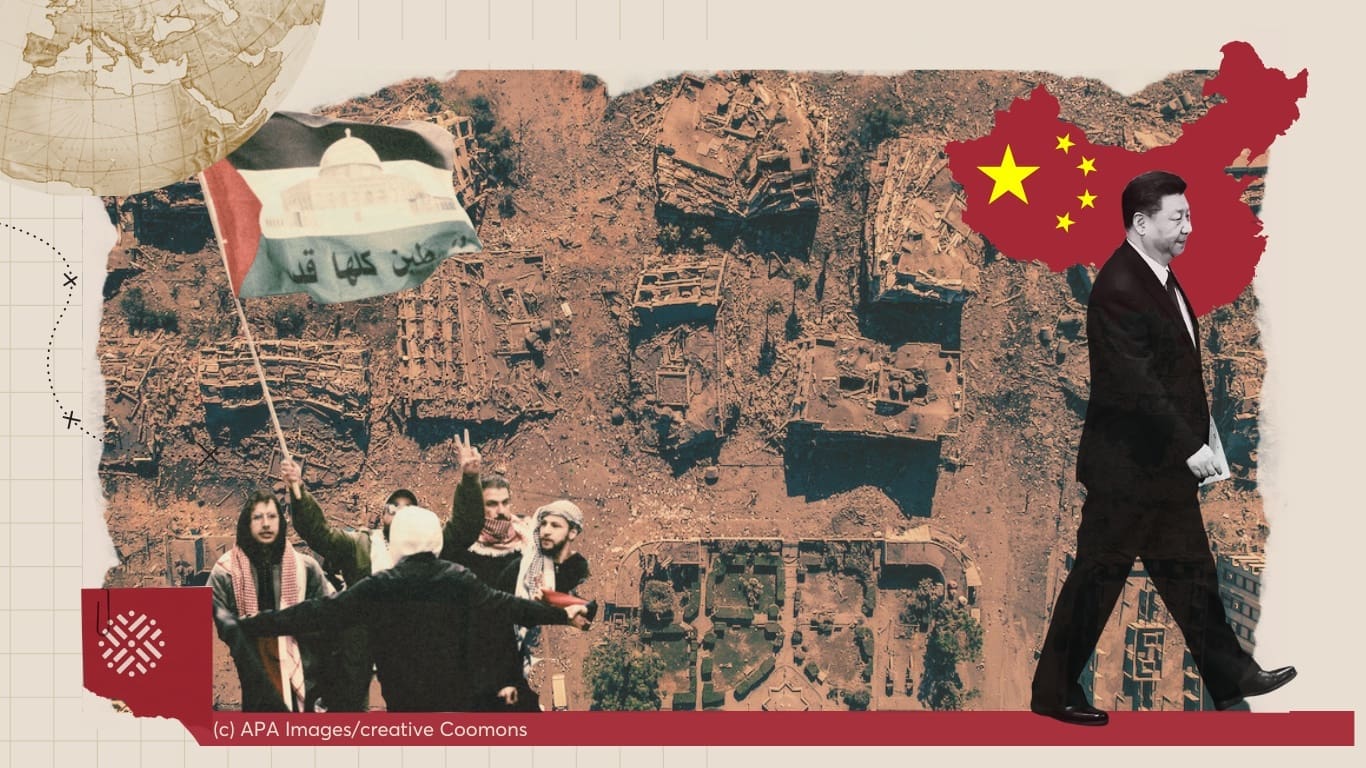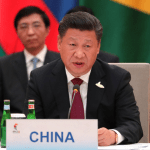
Introduction
Nearly two years into Israel’s genocidal war on Gaza, China’s ambassador to Israel, Xiao Junzheng, condemned the October 7 attacks as a “tragedy [that] shocked the world” while recounting his participation in Israel’s official Holocaust Remembrance Day ceremony. He folded the operation into a memorial narrative of Jewish historical suffering rather than situating it in the context of occupation and apartheid. By doing so, Xiao reinforced Israeli narratives that cast October 7 as rooted in antisemitism, thereby deepening Israeli impunity and enabling genocide. In November 2024, Xiao signaled that Beijing’s strategic interests with the Israeli regime remain intact despite the genocide, underscoring the dissonance between China’s UN rhetoric and its actions.
This policy memo shows how China’s “biased impartiality,” which privileges the Israeli regime, drives its strategic distancing from the genocide in Gaza. This position is not simply the result of US dominance over Israel-related affairs but a calculated decision to protect China’s long-term interests. By calling for Palestinian unity without exerting pressure on the Israeli government, Beijing shields its ties with the Zionist state under the guise of restraint. In addition, it deflects responsibility for stopping the genocide onto the UN Security Council (UNSC), casting ceasefire, humanitarian access, and prisoner release as obligations for others in order to absolve itself of direct accountability.
China’s Position on the Genocide
Despite presenting itself as a prominent representative of the Global South, China has refrained from assuming a front-line role in confronting Israeli war crimes in Gaza. In contrast to the Hague Group—a coalition of Global South states that leverages international law to contest Israeli impunity—Beijing has avoided taking measures, such as recalling its ambassador, downgrading relations, imposing sanctions, or suspending agreements.
Chinese officials signaled that Beijing’s strategic interests with the Israeli regime remain intact despite the genocide, underscoring the dissonance between China’s UN rhetoric and its actions Share on XChina’s policy is most evident in its refusal to recognize the Gaza crisis as genocide, underscoring its prioritization of domestic and geopolitical interests over meaningful action to halt mass violence against Palestinians. Despite possessing the global standing and political leverage to take a firm stance, Beijing confines itself to performative gestures, such as affirming before the International Court of Justice (ICJ) that Palestinians hold an inalienable right to armed resistance. China has not complemented such rhetorical statements with concrete legal or political action.
Meanwhile, evidence of material entanglement in the genocide exposes contradictions in China’s stance and points to complicity. Reports confirm that Israeli forces have altered and used Chinese-made DJI drones for surveillance and bombing in Gaza. DJI, a privately held Chinese drone manufacturer, has reportedly received funding from state-affiliated investors. While the company maintains it operates independently, these links have prompted questions about Beijing’s neutrality and the coherence of its foreign policy amid ongoing mass violence.
Five Drivers of China’s Political Strategy
Behind the façade of rhetorical neutrality lie five interlocking factors that illuminate why Beijing has opted for distance instead of contronting the Israeli regime. First, Beijing does not view Gaza as a critical geopolitical battleground. Indeed, for Beijing, the war in Gaza does not fit into the global chessboard of great power rivalry. While China has routinely invoked “Cold War rhetoric” to denounce Western interventionism when discussing Ukraine, Libya, or Syria, it has avoided applying the same framing to Palestine. This omission is especially notable given the US and its allies’ unequivocal support for Israel’s military campaign, a textbook case of Cold War-style alignment.
Second, although Palestine has formally joined the Belt and Road Initiative (BRI), it lies outside the main geographic corridors and economic hubs that drive the project. Under Israeli occupation and blockade, Palestine lacks the infrastructure and sovereign control to benefit from BRI projects, and its inclusion is therefore largely symbolic, serving China’s diplomatic image rather than Palestinian development.
Rather than fulfilling its moral and legal obligations, China has opted for strategic distance, a position reinforced by Western failure to halt the genocide Share on XThird, unlike the US, which has approved record levels of military aid to Israel since October 7, 2023, China has avoided such direct entanglements, prioritizing its long-term strategic ambitions. Beijing has focused on projecting power through the BRI and by expanding its defense budget, which rose 7.2% in 2024 to an estimated $229 billion—about 13% of global military spending.
Fourth, China benefits from the shifting regional landscape in which many Arab governments have deprioritized the Palestinian cause through normalization agreements with Israel. This realignment provides Beijing with diplomatic cover: its limited engagement on Palestine is unlikely to strain relations with Gulf states or the broader Arab world. As Arab regimes deepen ties with the Israeli regime, China sees little incentive to risk political friction by taking a more assertive stance.
Finally, China’s global image benefits from the genocide without requiring meaningful action. As the atrocities persist, the West’s moral credibility erodes, allowing Beijing to cast itself as a more principled actor by comparison. Following the US veto of a UNSC ceasefire resolution in December 2023, Chinese Ambassador Zhang Jun delivered a veiled rebuke, urging states to prioritize moral responsibility over geopolitical self-interest and reject double standards. Such statements enable China to accumulate symbolic capital and expand its soft power without incurring political risk or concrete responsibility.
Recommendations
Confronted with mass atrocities in Gaza, Beijing has offered neither leadership nor transformative diplomacy. Rather than fulfilling its moral and legal obligations, China has opted for strategic distance, a position reinforced by Western failure to halt the genocide. When the US and its allies refused to uphold their commitments under international law, they eased pressure on Beijing. Washington’s unconditional support for Israel has enabled the violence to continue, giving China space to pose as a principled power while taking no meaningful action.
Palestinians, at both official and grassroots levels, must urgently reconsider their engagement with China. The assumption that Beijing can serve as a counterweight to the West is overly optimistic and recalls earlier miscalculations, when Palestinian leaders placed too much hope in US mediation. What this moment demands is not romanticization but accountability.
- Expose and Challenge China’s Economic Complicity: Palestinian civil society should press for global demands to end all corporate operations and investments tied to illegal Israeli settlements, including those involving China. By continuing to engage with settler infrastructure, Beijing undercuts its stated commitment to international law and undermines its credibility as a Global South rival to Western power.
- Pressure China to Revise Its Diplomatic Language: Beijing’s references to Israel as a “Jewish state” echo Zionist framings that erase Palestinian rights and historical claims. Palestinian officials and civil society actors must press China to adopt international legal language that reflects the reality of Israeli settler colonialism and apartheid, not echo Zionist narratives that obscure structural violence. At the same time, the international community should press China to recognize and adopt the terminology of genocide used in legal proceedings at the ICJ and the International Criminal Court, both to describe present realities and call for accountability and justice.
- Develop a Critical Research Agenda on China: Palestinian scholars must resist the trend of reproducing China’s self-styled moral superiority and instead develop research agendas that interrogate Beijing’s foreign policy, strategic interests, and complicity in the genocide and in Israel’s occupation of Palestine. This intervention is particularly urgent, given that China continues to rise as a global power.
- Initiate Strategic Dialogue with Chinese Scholars: Palestinian academic institutions should actively engage Chinese scholars, including those affiliated with the Communist Party. These exchanges must move beyond symbolic or performative diplomacy and bring critical Palestinian perspectives into Chinese policy circles.
Razan Shawamreh, PhD, is a scholar of International Relations specializing in Chinese studies, with a particular focus on China’s foreign policy in the Middle East and North Africa. She currently lectures in the Global Studies and International Relations MA program at Al-Quds University—Bard College.














